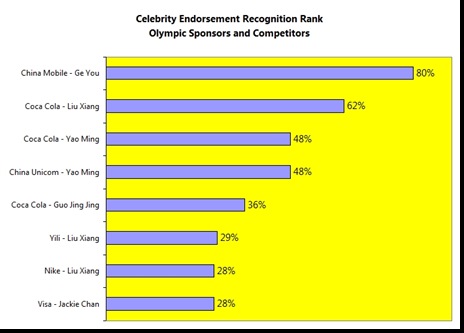As many world records were broken in the Beijing Olympics, the 2008 Game itself has also set a record of its own as the most-watched Olympics ever.
According to a Nielsen report, the Beijing Olympics attracted a cumulative TV audience of 4.4 billion during the first 10 days of the Game (8-17 August). This number equates to almost two-thirds of the World’s population.
Marketers saw this as huge opportunities, and global sponsors were estimated to have spent US$3.2 billion to secure exclusive rights to sell their products through the Olympics. According to R3, a Beijing media consultancy, spending from the 12 top-line sponsors was 44% higher compared to the 2004 Athens Games.
This is not all. Sponsors are estimated to have spent another $54.3 billion on media advertising, 19% more than before. Besides the money spent on buying prime time media slots, a big amount went to the athletes. In China, you can see sports stars and supporting celebrities such as basketball player Yao Ming, hurdler Liu Xiang or Jackie Chan – anywhere from TV ads to a can of coke.
Nielsen’s consumer research had evidenced use of well-known Chinese athletes and celebrities in advertising campaigns are paying off. Actor Ge You, endorsing China Mobile had 80% of the consumers recalling his appearance in China Mobile advertisements. Other stars enjoy similar recall rates.
From a marketing communications point of view, it is pleasing that product and corporate brand profiles can be raised with the stars. When consumers can connect their favourite stars with a brand, they would take less notice of competitive products and shorten their buying decision process.
It’s all very good if the recall connections are correct. The same Nielsen report shows wrong associations – Jackie Chan with Coca-Cola, or Yao Ming with Nike, Adidas and Pepsi.
This is no surprise. When many brands (although very different products) are associated with the same star, consumers could be easily confused. Liu Xiang for example, can be found everywhere in China selling Coco-Cola, Visa, Cadillacs, Nike, Lenovo, etc. etc.
Marketers are best advised to consider the uniqueness of their promotion strategies to avoid mistaken identity.
Source: The Nielsen Company
Interesting Fact: Huge sums, but where did all these money go? The money is in, but who else is sharing the cake? Wang, the Assistant Officer from the Athletics Administrative Center under the China State’s General Sports Administration, told the media about how revenues from product endorsement are split:
The athletes in China, especially the ones who compete on national ground, often do not have an ‘agent’ like other countries do. The Government manages their schedule and income sources. |

0 comments
Post a Comment